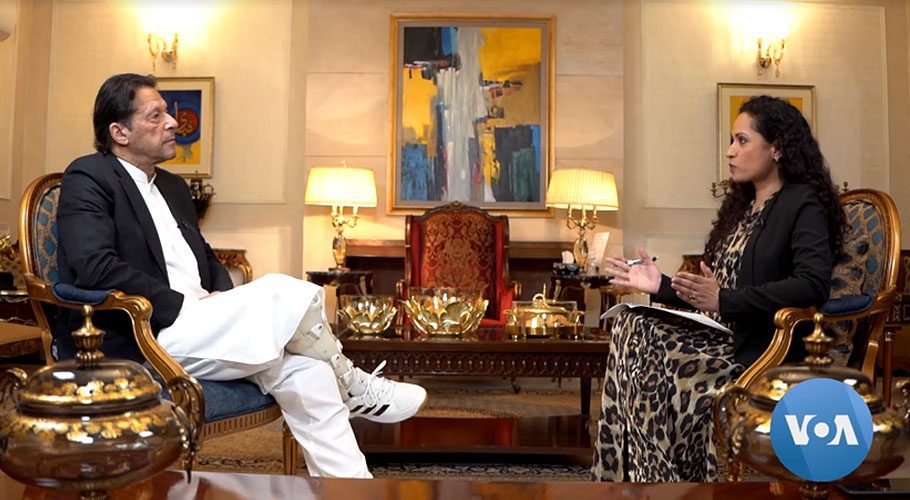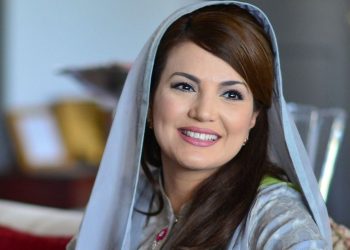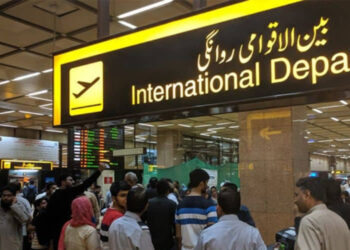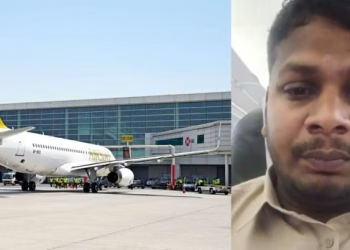KARACHI: The Chairman of Pakistan Tehreek-e-Insaf (PTI) Imran Khan has blamed negligence of the security forces’ that allowed the Pakistani Taliban, or the banned TTP, to resume its activities, and expressed hope that the military would stop interfering in politics and would build good relations with Washington — despite accusing it of conspiring in his ouster.
Also read: Fawad Chaudhry asks ‘inappropriate’ bureaucrats to step aside in Punjab
In an interview with Voice of America, Imran Khan was asked if he stood by his decision to greenlight talks with TTP when, according to the National Counterterrorism Authority, the time that was taken for negotiations with TTP was used by that group to reorganize, thus resulting in spike in terror incidents?
Also read: LHC verdict: PTI invites govt for talks on general elections
Responding to this question, Imran Khan said said “what were the choices [the] Pakistani government faced once the Taliban took over and they decided the TTP, and we’re talking about 30, [30,000] to 40,000 people, you know, the families included, once they decided to send them back to Pakistan? Should we have just lined them up and shot them, or should we have tried to work with them to resettle them?”
Also read: JI Amir Sirajul Haq demands general elections at the earliest
He said”we had a meeting, and the idea was that the resettlement had to be done with the concurrence of the politicians of all along the border, the FATA [tribal] region, and along with the security forces, plus, the TTP. But that never happened because our government left and once our government was removed, the new government took its eye off the ball.”
Imran Khan asked that this threat grew and it’s possible that they regrouped, but then where were the Pakistani security forces? Where were intelligence agencies? Could they not see them [re]grouping? adding that “how could we be held responsible for their negligence?”
Relationship with Pakistani military:
When asked by VOA about what kind of a relationship the military should have with the civilian government and with any political party, Imran Khan said “Military [in Pakistan] means one man, the army chief. So, the whole policy of military vis-a-vis their dealing with the civilian government depends on the personality of one man. The positive side during our relationship with Gen. [Qamar Javed] Bajwa, rather than the military, we were on the same page, which meant that we had the organized strength of Pakistan army to help us … and we worked together, and you know, Pakistan was considered one of the success stories of the COVID-19. Now, the problem was that Gen. Bajwa favored some of the biggest crooks in this country, and he did not think corruption was a big problem, and he wanted us to work with them. What that meant [was] giving them immunity from their corruption cases.”
He said General Bajwa had a very close relationship with Shehbaz Sharif, the current prime minister, and for some reason, he conspired, and this regime change took place.
Also read: Imran claims General Bajwa confessed he was behind ‘regime change operation’
When asked about future scenario if PTI comes back to power, Khan said “the leading principle of the balance [of power] is that the elected government that has the responsibility, which people have mandated through their vote, must also have the authority. You cannot separate responsibility and authority. So, if the authority lies with the army chief, [but] responsibility lies with the prime minister, no management system works.”
Imran Khan said “I’m sure amongst the new military leadership there is a realization that this experiment of regime change has gone wrong. Pakistan’s economy has gone into a tailspin, we are facing the worst crisis in our history, the economic crisis, but not just that, the governance crisis, and there’s no way to get out of this. The only way is that we have a paradigm shift with [how] Pakistan has been run.”
When asked if he still believed that U.S. played a role in removing him from office, Imran Khan said “well, the cipher is a reality. It was an official meeting [that] initiated [conversation on] both sides, between Donald Lu, the Undersecretary of State for South Asia, and the Pakistan ambassador, and this was brought to the National Security Council and cabinet.”
He further said “having said that, it’s in the past, we have to move on. It’s in the interest of Pakistan to have good relations with the U.S. and that’s what we intend to do.”





































